|
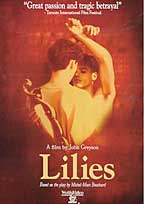
Lilies
Wolfe Video, 1996
Director:
John Greyson
Screenplay:
Michel-Marc Bouchard,
from his play
Starring:
Brent Carver, Marcel Sabourn, Aubert Pallascio, Jason Cadieux, Matthew
Ferguson, Remy Girard, Gary Farmer
Rated R, 96 minutes

The
Hanging Garden
MGM
Video, 1997
Director/Screenplay:
Thom Fitzgerald
Starring:
Ian Parsons, Peter MacNeill, Troy Veinotte, Kerry Fox, Mark Austin
Rated R, 91 minutes
|
Remembrance
of Things Past
by
Michael D. Klemm
Reprinted
from Outcome, November, 1999
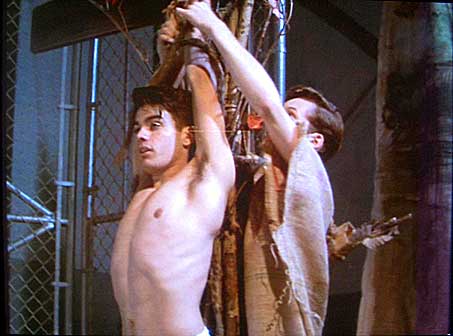
Hollywood films tend
to be too literal; the same tired formulas are rehashed ad nauseum and
filmmakers are afraid to try anything new which might challenge their
audience. One only needs to look at foreign and independent cinema to
see how to break away from conventional molds. Or, in this case, our northern
neighbors. Two Canadian directors address the agonies of gay adolescence
through evocatively stylized, almost surreal, films.
|
|
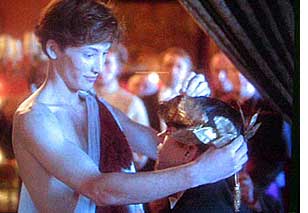 In
Lilies, an adaptation by playwright
Michel Mare Bouehard of his play, Les Feluettes, director John
Greyson establishes a tragedy of operatic proportions in a low prison
setting ala Jean Genet. The result is a
poetic film which rejects realism, favoring a more lyrical and flamboyantly
theatrical style. And, despite its artistic flourishes, it's entertaining
as hell. In
Lilies, an adaptation by playwright
Michel Mare Bouehard of his play, Les Feluettes, director John
Greyson establishes a tragedy of operatic proportions in a low prison
setting ala Jean Genet. The result is a
poetic film which rejects realism, favoring a more lyrical and flamboyantly
theatrical style. And, despite its artistic flourishes, it's entertaining
as hell.
It's 1952. Bishop
Bilodeau, played by Marcel Sabourin, visits a Quebec prison to hear a
dying man's confession. Albert Pallascio is Simon, a bitter old man who
turns the tables on the bishop by confessing that he is about to commit
"the sin of revenge." Simon's fellow inmates then take the bishop
prisoner and perform a play for their captive audience of one. The drama's
subject is a shocking episode from Bilodeau's own youth in 1912 which
led to Simon's incarceration. The bishop is at first appalled, and then
saddened by the play. Roles are reversed when Bilodeau is forced to make
a confession and then ask the elderly Simon's forgiveness.
|
|
 In
the play, which catches the conscience of the king, the women's parts
are performed out of necessity by the inmates in drag. Then the play opens
up. The story flows seamlessly between scenes performed in the prison
chapel and ones which are filmed in the real world as if they were flashbacks.
The prisoners play the same parts in both settings. In
the play, which catches the conscience of the king, the women's parts
are performed out of necessity by the inmates in drag. Then the play opens
up. The story flows seamlessly between scenes performed in the prison
chapel and ones which are filmed in the real world as if they were flashbacks.
The prisoners play the same parts in both settings.
The first tableau
is a staging of the martyrdom of St. Sebastian. The scene is a rehearsal
for a school play. The young Simon, played by Jason Cadiuex, is a beautiful
youth who is tied to a tree and kissed by his best friend, Vallier. Their
passion is interrupted by the young Bilodeau, a boy headed for the seminary.
He preaches about sin while secretly lusting after Simon because he is
"as beautiful as a saint."
|
|
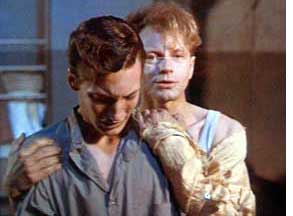 Vallier's
mad mother, the Countess de Tilly, (played to perfection by Brent
Carver), is enthralled by her son's love for Simon. When she stupidly
speaks of their trysts to Simon's father, he responds by whipping his
son senselessly. This already explosive situation escalates when Lydie-Anne,
a French aristocrat, arrives in a hot air balloon and takes a shine to
Simon. Still reeling from his beating, Simon decides that it's "time
to think about girls." He is quickly swept away by the exotic French
woman, to the sorrow of Vallier. Bilodeau, meanwhile, prays to God that
"the Babylonian" will not take Simon away from him. Vallier's
mad mother, the Countess de Tilly, (played to perfection by Brent
Carver), is enthralled by her son's love for Simon. When she stupidly
speaks of their trysts to Simon's father, he responds by whipping his
son senselessly. This already explosive situation escalates when Lydie-Anne,
a French aristocrat, arrives in a hot air balloon and takes a shine to
Simon. Still reeling from his beating, Simon decides that it's "time
to think about girls." He is quickly swept away by the exotic French
woman, to the sorrow of Vallier. Bilodeau, meanwhile, prays to God that
"the Babylonian" will not take Simon away from him.
|
|
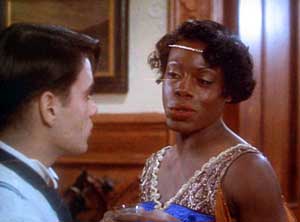 This
is a film of rare beauty and passion which throws conventions of realism
out the window. Its stylistic nature works because the acting is so strong
that it matters little whether the setting is realistic or feigned. The
use of male actors in female roles might seem anachronistic to some but
this is a technique which is common in the theatre even though it rarely
happens in movies. The effect is a little jarring at first - and it was
to some critics - but an open-minded viewer will quickly become used to
it. This
is a film of rare beauty and passion which throws conventions of realism
out the window. Its stylistic nature works because the acting is so strong
that it matters little whether the setting is realistic or feigned. The
use of male actors in female roles might seem anachronistic to some but
this is a technique which is common in the theatre even though it rarely
happens in movies. The effect is a little jarring at first - and it was
to some critics - but an open-minded viewer will quickly become used to
it.
The actors play the
women with subtlety and grace, rather than as screaming queens. The legendary
Brent Carver is especially convincing as
the mad Countess who thinks the shack on the lake, where she lives with
her son Vallier, is really a manor house on the Mediterranean. His gait
is delicate and feminine, and his acting a delight. Lydie-Anne is played
by a man of color named Alexander Chapman who looks fabulous in drag.
The exotic nature of this visiting French woman is amplified by the screen
presence of a virile black man in the role.
|
|
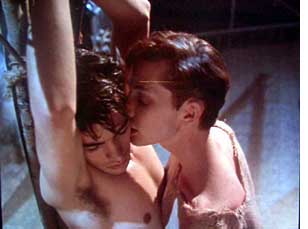 Lilies
plays freely with the theme of religious hypocrisy. The young Bilodeau
is a parody of every self righteous fire-and-brimstone preacher that has
ever plagued fiction. He rages about sin but gazes longingly on Simon's
nude body while he bathes by the lake. It is appropriate that the boys
are first seen rehearsing a play about the martyrdom of St. Sebastian,
which has to be one of the most homoerotic images in all of Christian
art. When Bilodeau interrupts the rehearsal by preaching about Sodom and
Gomorrah, Vallier and Simon tie him to the tree. Simon tries to kiss Bilodeau,
giving him a "taste of hell," as the mortified lad screams "I
don't want to be sick like you." Bilodeau is yet another in a long
line of pious homophobes who is unable to reconcile his own sexual desires. Lilies
plays freely with the theme of religious hypocrisy. The young Bilodeau
is a parody of every self righteous fire-and-brimstone preacher that has
ever plagued fiction. He rages about sin but gazes longingly on Simon's
nude body while he bathes by the lake. It is appropriate that the boys
are first seen rehearsing a play about the martyrdom of St. Sebastian,
which has to be one of the most homoerotic images in all of Christian
art. When Bilodeau interrupts the rehearsal by preaching about Sodom and
Gomorrah, Vallier and Simon tie him to the tree. Simon tries to kiss Bilodeau,
giving him a "taste of hell," as the mortified lad screams "I
don't want to be sick like you." Bilodeau is yet another in a long
line of pious homophobes who is unable to reconcile his own sexual desires.
The photography in
Lilies is beautiful. Scenes
shift between settings through clever uses of sound effects and slides
projected on a screen. Flames, a symbol of passion, lust and destruction,
are prevalent as Simon strikes a match as each new act of the play begins.
Visual symbols abound, such as the cages and fences which surround the
prison chapel. The elderly Simon's face is first seen through a grate
in the confessional. A climactic love scene between Simon and Vallier
takes place in a large tub in the center of the prison stage while leaves
fall from above on the doomed lovers.
|
|
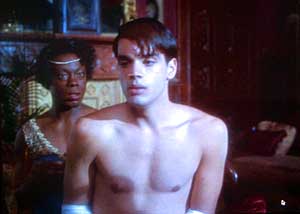 Most
plays which celebrate their theatricality usually do not translate well
to the screen. For example, on stage Equus featured a chorus of
men wearing wire masks to represent the horses. In the film version, this
device was eliminated to comply with the standards of realism. The costumed
horses would have been out of place, but everything that made the play
so unique was lost in the translation. Lilies
manages the almost impossible feat of integrating this
theatricality into the language of cinema. I highly recommend this amazing
film. Most
plays which celebrate their theatricality usually do not translate well
to the screen. For example, on stage Equus featured a chorus of
men wearing wire masks to represent the horses. In the film version, this
device was eliminated to comply with the standards of realism. The costumed
horses would have been out of place, but everything that made the play
so unique was lost in the translation. Lilies
manages the almost impossible feat of integrating this
theatricality into the language of cinema. I highly recommend this amazing
film.
Reviewer's
note, 2007: John Grayson is also the director of Zero
Patience (1993) and Proteus (2003). He also directed four
installments of Showtime's Queer as Folk,
including the surreal episode where Emmet's chatroom screen name comes
to life.
Brent
Carver, who beautifully embodied the delightfully
mad Countess, is a regular at Stratford and won a Tony for Kiss
of the Spider Woman on Broadway.
Also among his many credits, he played David in the Toronto stage production
of Brad Fraser's Unidentified
Human Remains And The True Nature Of Love (filmed
by Denys Arcand as Love
And Human Remains. Matthew
Ferguson (the young Bilodeau)
played Kane in Love
And Human Remains.
|

CLICK
THE ABOVE BANNER TO PURCHASE THIS WOLFE VIDEO TITLE
|
|
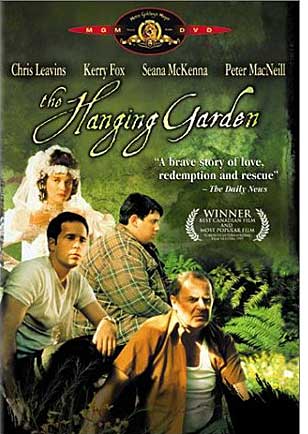 Distinct
stylization is also used to great effect in writer/director Thom Fitzgerald's
1997 film, The Hanging Garden. Distinct
stylization is also used to great effect in writer/director Thom Fitzgerald's
1997 film, The Hanging Garden.
After a ten year
absence, a prodigal son returns home to attend his sister's wedding. When
they last saw Sweet William, he was a 350 pound adolescent with zero self
esteem. William, played by Chris Leavins, has grown into a slim, attractive
and confident man who lives happily with another man. If only the rest
of his family was as well adjusted as he. One look at them and it is immediately
apparent why he ran away from home. The wedding provides a framing story
for an extended flashback in which William is an abused teen.
We see his father,
Whiskey Mac, a drunk who often hits the boy. William's grandmother is
losing her mind and is kept upstairs in the attic. His mother, Iris, longs
for escape but tries valiantly to keep her family together. William is
in love with his sister Rosemary's boyfriend, Fletcher. A late night rendezvous
in the garden between William and Fletcher is witnessed by the mad grandmother,
who wakes the household with her screams. William's mother tries to "save"
her son by paying a local woman to have sex with him. William is so humiliated
by the experience, and then by Fletcher's rejection, that he attempts
suicide by hanging himself in his father's garden.
|
|
 Returning
home for Rosemary's wedding awakens old ghosts. For starters, being newly
married doesn't stop the groom, Fletcher, from flirting with his old friend.
If this isn't enough, William also discovers a young sister named Violet
who hadn't yet been born when he left home. Because she is very tomboy-ish,
William first mistakes Violet for a boy. Her parentage is the subject
of a later plot twist. His father still drinks, his grandmother has grown
even more senile and the almost-blind family dog walks into walls. Returning
home for Rosemary's wedding awakens old ghosts. For starters, being newly
married doesn't stop the groom, Fletcher, from flirting with his old friend.
If this isn't enough, William also discovers a young sister named Violet
who hadn't yet been born when he left home. Because she is very tomboy-ish,
William first mistakes Violet for a boy. Her parentage is the subject
of a later plot twist. His father still drinks, his grandmother has grown
even more senile and the almost-blind family dog walks into walls.
|
|
 The
homecoming turns nightmarish when he spies his formerly obese self standing
amongst the guests. While he speaks to his mother in the kitchen, a young
boy walks in and begins binge-eating at the table. When William takes
a stroll through the garden, he sees his former self hanging from a tree.
Strangely enough, the rest of the family is plagued by this vision as
well, forever reminding them of their collective guilt as they are forced
to face the horror of it. This strange visual contradiction of time frames
collide with the force of a passing hurricane in The
Hanging Garden. The
homecoming turns nightmarish when he spies his formerly obese self standing
amongst the guests. While he speaks to his mother in the kitchen, a young
boy walks in and begins binge-eating at the table. When William takes
a stroll through the garden, he sees his former self hanging from a tree.
Strangely enough, the rest of the family is plagued by this vision as
well, forever reminding them of their collective guilt as they are forced
to face the horror of it. This strange visual contradiction of time frames
collide with the force of a passing hurricane in The
Hanging Garden.
|
|
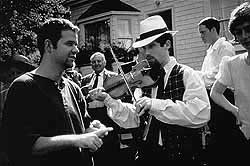 Without
a doubt, The Hanging Garden
features one of the most dysfunctional families ever put on celluloid.
Their names, each one a flower from the garden, adds to the film's surreal
nature. The quirky characters help to keep
The Hanging Garden from being a complete downer as they
add a sense of the absurd into the otherwise depressing plot. Troy Veinotte
shines as the adolescent William. While it is easy for an audience to
identify with an attractive leading man, the overweight William is an
unforgettable character who evokes pity instead of being the butt of rude
fat jokes. The entire cast is to be commended for making their characters
fully rounded personalities rather than cardboard caricatures. Peter MacNeill
is especially effective as the brutish father, as is Seana McKenna as
his long suffering wife. Fans of the gay Celtic fiddler Ashley MacIsaac
will be interested to know that he provides much of the film's soundtrack
and that he also appears as a musician at the wedding. Without
a doubt, The Hanging Garden
features one of the most dysfunctional families ever put on celluloid.
Their names, each one a flower from the garden, adds to the film's surreal
nature. The quirky characters help to keep
The Hanging Garden from being a complete downer as they
add a sense of the absurd into the otherwise depressing plot. Troy Veinotte
shines as the adolescent William. While it is easy for an audience to
identify with an attractive leading man, the overweight William is an
unforgettable character who evokes pity instead of being the butt of rude
fat jokes. The entire cast is to be commended for making their characters
fully rounded personalities rather than cardboard caricatures. Peter MacNeill
is especially effective as the brutish father, as is Seana McKenna as
his long suffering wife. Fans of the gay Celtic fiddler Ashley MacIsaac
will be interested to know that he provides much of the film's soundtrack
and that he also appears as a musician at the wedding.
The new crop of gay
independents, Edge
of Seventeen and Get Real for example, have all been enjoyable
and important films in that they can teach valuable lessons to teens about
accepting those are different from the "norm." But Lilies
and The Hanging Garden are
terrific examples of what happens when a gifted artist gets his or her
hands on a movie camera. Both films can both be rented at Mondo Video
at 1109 Elmwood Avenue, and Lilies can also be rented at Rainbow Pride,
located in Buddies at 31 Johnson Park.
More
On John Grayson
Zero Patience
Proteus
More On Thom Fitzgerald:
Cloudburst
More On Brent
Carver:
Interview
With Brad Fraser, 2004
Peter MacNeill also
appears in:
Queer As Folk
Gary Farmer also
appears in:
Twist
|
|
Reviewer's note,
2007: Interjecting a bit of autobiography and historical context here.
In many of my older reviews there are references to these films being
unavailable at Blockbuster Video. Times have changed, but in the 90s,
that was the case. They were a "family store." Blockbuster's
policy back then (since changed) of not carrying NC-17 or unrated films
forced many filmmakers to emasculate their films to get an R rating
so Blockbuster "the family store" would carry it. .I usually reported
if the films were available for rent at Buffalo's two funkiest video
stores - Mondo Video, which was owned by the film critic from Artvoice
Magazine, M. Faust, and was the place to go to get the hard
to find titles - and Rainbow Pride, a gay gift shop run by Frank Ball;
he also rented videos. For years, his store was the front room in a
popular gay bar, Buddies.
Anyway, when I
wrote this review you could not find titles like these at Blockbuster.
And I often ranted about it. I've left them in these reviews as I put
them online because they are a kind of time capsule. Because early in
the millennium there was a changing of the guard at Blockbuster. You
could rent Queer as Folk there now! Their
old policy of no gay films and no unrated films was gone, finished.
And that was good news for filmmakers and film lovers everywhere. I
even ended one of my columns with a public service announcement that
Blockbuster changed its policies and now carried gay films. I'm not
being coerced into writing this, I'm just being fair because that was
a big turnaround. Of course it was also around the time I discovered
netflix.com and saw that I could rent almost anything from them.
Foreign films, independents and of course queer cinema. This note is
just to explain how times have changed (for the better) and it is much
easier to find queer titles now, whether for rent or for sale. The internet
of course got us out of the dark ages too.
|

